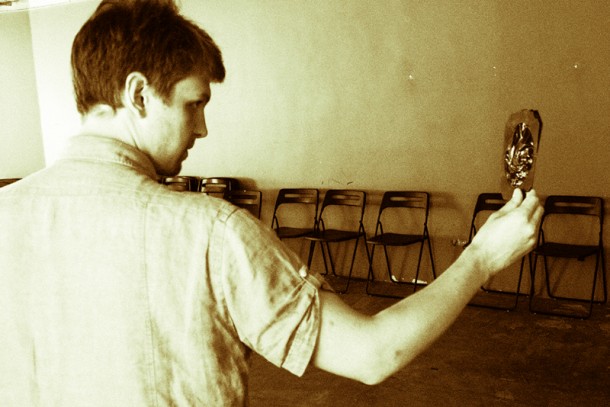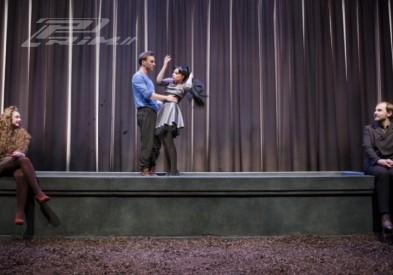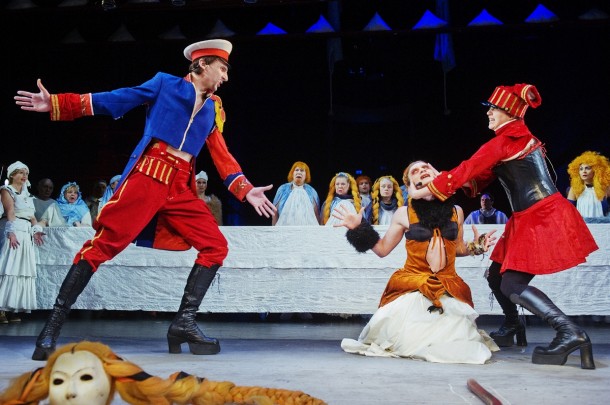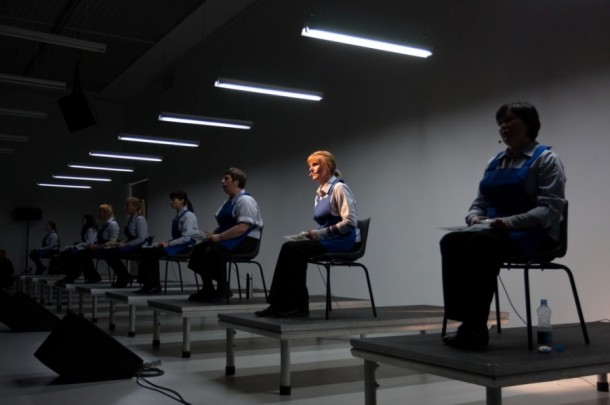Now in its tenth year, the Lithuanian Showcase at the Sirenos Theatre Festival invites international spectators to experience the best of contemporary theatre in the country. The original impetus of Sirenos in 2004 was to bridge artistic relations between east and west in post-communist Europe. As a result, the Lithuanian showcase is followed by the work of international directors and companies from as far afield as Ireland, Georgia, Italy, and Russia. The close proximity between participating theatres inside the Old Town made it possible to walk between each venue through Vilnius’s winding, atmospheric streets, making the festival a particularly intimate and comfortable experience. Audra Žukaitytė, the artistic manager of the festival, this year dedicated to the audience noted that Sirenos’ spectators do not have a traditional passive relationship with the theatre but are rather coauthors of the performance events. This was perhaps rather wishful thinking. Whilst most of the festival’s repertoire was engaging and provocative, the experience of traditional theatre venues and audience-performer relations was left wholly intact.
Although officially organized by the OKT (Oskaro Koršunovo Teatras)/Vilnius City Theatre, the main venue for the festival has become the two stages of the National Drama Theatre (Lietuvos nacionalinis dramos teatras). The opening was a particularly significant production of Polish playwright Tadeusz Słobodzianek’s Our Class (Nasza klasa) by the international director Yana Ross, a graduate of GITIS in Moscow and the Yale School of Drama. Though the play was awarded the Nike Prize, the most highly regarded literary award in Poland, it has also caused some controversy among conservative nationalists, particularly for its examination of Polish collusion in an anti-Semitic pogrom during the Second World War. The Lithuanian premiere was preceded by a public forum on “Art and the Holocaust,” attended by the playwright and the director as well as German and Lithuanian critics, where the relationship between historical trauma and the crisis of representation was hotly debated. Ross, who has worked at the Berlin Volksbühne and the Finnish National Theatre, has brought a striking, new directorial approach to the Lithuanian stage. The production differed from other recent premieres of the play in Poland and the UK in its use of live music, tragic-comedic tone, vibrant aesthetics and expressionistic lighting. Circus tricks replaced acts of violence and brutality, offering the audience a Brechtian distance between Ross’s lively and mischievous form and the explicitly tragic content. The younger members of the National’s ensemble performed the first part of the text, which focuses on Nazi-occupied Poland and the inauguration of Soviet-style communism, while older actors embodied more recent post-1989 history. The shifting of roles between younger and older actors evidenced the significant talent of an ensemble that works together with confidence and striking intimacy. Though some Lithuanian critics snubbed Ross for her unconventional treatment of Holocaust themes, the playwright Słobodzianek judged this to be the most successful treatment of Our Class to date.

The Seagull, OKT (Oskaro Koršunovo Teatras)/Vilnius City Theatre, directed by Oskaras Koršunovas. Photo: Tomas Ivanauska.
Two new pieces by Oskaras Koršunovas, perhaps the best-known theatre director outside of Lithuania, were shown in OKT’s cramped performance space that resembles a modern office. Koršunovas was successful in his paring down of Chekhov’s The Seagull to its most basic components, moving away from outmoded and static interpretations of the play that dominate many East European repertoires. The stripped-back aesthetics and concentration on naturalistic acting technique was reminiscent of Thomas Ostermeier’s early productions at the Baracke in Berlin. The cast started the performance amongst the audience, slowly disengaging themselves one at a time to perform the text, almost reluctantly at first but with greater nuance and sincerity as the performance developed. Under harsh fluorescent lighting the stage technology was reduced to a single projection of a lake and Trigorin’s mobile phone, which was used to capture photographs of poetic moments in nature for later literary recreation in his novels. The ensemble worked together with a psychological intensity that Koršunovas is well known for producing in his actors. The director’s close reading of the text was richly rewarded. Particularly memorable were the performances of Nelė Savičenko as Irina Arkadina, icy and self-important one moment, childish and emotionally vulnerable the next, who contrasted sharply with Martynas Nedzinskas as a violent and troubled Treplev. This very impressive offering was rather disappointingly followed by Koršunovas’s production of Samuel Beckett’s Krapp’s Last Tape, starring Juozas Budraitis. Though Budraitis is a much heralded actor in Lithuania, the production was limited by the quiet burbling of the monologue, which even in the small space felt overly internalized and ultimately inaccessible, the very opposite of the precise and expressive direction of The Seagull.
One of the clear delights of the festival was Have a good day! (Geros dienos!) by the movement of young artists known collectively as Operomanija, presented at the Arts Printing House (Menų spaustuvė), a diverse theatre venue that hosts an impressive archive and offers residencies to international theatre companies and administrators. Writer Vaiva Grainytė teamed up with the composer Lina Lapelytė to make a charming and funny new piece of opera about disgruntled supermarket cashiers. A line of women in blue overalls sitting in simple black chairs under strip lighting sing their troubles as they relentlessly scan items at a checkout. Slowly transforming the contemporary world of commerce into a prison where workers are treated like captives, the performance offered a refreshing appraisal of capitalism and its impact on the individual. On the main stage of the National Theatre, Ginataras Varnas also offered a critique of modern consumerism, though the focus was on the impact global economies have on nature and wildlife. Varnas, known for his frank and humorous portrayals of alternative sexualities, unfortunately produced a very confused and shambolic production of Euripides’ Bacchae. Though the themes in the text were relevant to the director’s emphasis on man’s manipulation of nature, the acting was flat and the chorus of Bacchantes pranced around the stage without direction. Video projections only further confused the production with disturbing images of seabirds choking on oil slicks and–very mysteriously–a camel sliding around a butcher’s shop in a pool of its own blood. Varnas’ partner, the fashion designer Juozas Statkevičius, created an array of costumes that was incoherent and historically inconsistent, moving between medieval religious robes and contemporary bright green tracksuits. Overall, this staging of a Greek classic was a massive disappointment from a director who has become one of the most respected in the country over the last decade.
Audiences were more divided over the adaptation of Chuck Palahniuk’s novel Fight Club at the State Youth Theatre. Previously known as the Children’s Theatre, the institution’s name was changed to reflect the avant-garde work of the young generation of artists that is now on offer. Vidas Bareikis started a new company called “No Theatre” that seeks to overthrow conventional theatre practices and to discover a fresh dialogue with audiences. The purported search for a new theatrical language created high expectations in the international audience that were not entirely met. The opening scene took place in the courtyard of the eighteenth-century building, with loo roll, white paper, and red and black flags flying out from open windows onto fire breathers below in time to classical music. The effect of this scenographic exploit was somewhat dampened by a sudden and heavy outbreak of rain, and the audience hurried inside to the freezing cold auditorium for the main performance. While there was an engagement with new multimedia, from animation, live video and music, and the staging displayed a sophisticated composition that included a ballet of animal taxidermy, it would not be possible to describe the production as challenging conventional theatre in terms of space, immersion, or narration. Nevertheless, this production differed radically from the other works in the festival, and also served as a showcase for some of the country’s most talented upcoming actors, Elzė Gudavičiūtė (Marla Singer) and Ainis Storpirštis (The Narrator) in particular.
Around the back of the National Theatre is the smaller black-box laboratory stage where Paulius Ignatavičius’s mounted a production of the young Austrian playwright Ewald Palmetshofer’s Hamlet is dead. No gravity. Focusing on an experimental and entertaining new piece of writing that regrettably did not offer very much in the way of direction, the production proved difficult for an international audience. The setting was dominated by muted Armani colors, pale browns and soft grays, and the play is punctuated by long monologues that rely on linguistic tricks for its humor. Following this, festival-goers returned to the main auditorium to see a premiere by Eimuntas Nekrošius, one of Lithuania’s most cherished directors, who has also worked extensively in Italy and Portugal. Television cameras were dotted around the theatre to film his highly anticipated adaptation of Dante’s Divine Comedy. The first two sections, Inferno and Purgatorio, were shown as one performance with Paradiso playing independently the following evening. Known for his highly impressionistic and evocative stage pictures made from simple stage properties and expressionistic lighting, there is often very little text in Nekrošius’s productions. In this adaptation, which opened in Vicenza, Italy earlier in 2013 to very encouraging reviews, Dante’s poetry is rendered in a series of pictorial vignettes. While the director’s understanding of the text is unquestionable and the images he creates are evocative and surreal, the seven-hour production was ultimately let down by its inexperienced cast. Nekrošius employed the students of his graduating class from the local Theatre Academy, and while there were some moments of well-polished ensemble work, the young actors were not up to the task of sustaining an entire production at this professional level. In Lithuania, a director leads a single year group of acting students through their entire training, and it is his responsibility to make sure they find professional work. This production showed the pitfalls in using a high-status premiere to showcase freshly trained actors. In contrast to the ensemble, Rolandas Kazlas’s strong and well grounded portrayal of Dante in modern dress demonstrated years of work with the director–Klazlas is particularly memorable for playing Iago in Nekrošius’s internationally renowned Othello–though the actor constantly had to compete with a rather heavy-handed soundtrack of French horns, strings, and piano that tended to dominate rather than serve the stage pictures.
Jonas Vaitkus mounted a musical adaptation of Alexander Vvedensky’s Christmas at the Ivanovs at the Russian Drama Theatre. Productions in the theatre are always staged in the Russian language, a leftover from Soviet days that has an uncertain future in Vilnius’s current cultural make-up. While the absurdist approach did not appeal to the international audience, Russian-speakers were riveted by Vaitkus’s playful critique of communist-era musical pageantry, both banal and bizarre. The plot hinges on a nanny who chops off the head of one of her young charges with an axe, and features a host of talking animals, pantomime dames and Eurovision-esque song and dance routines. On the opposing end of the spectrum of spectacle, the finale of Sirenos was presented by the Russian director Konstantin Bogomolov at the Vilnius State Small Theatre (Valstybinis Vilniaus Mažasis Teatras), which is now the Lithuanian home of Moscow-based Rimas Tuminas, the former artistic director of the National Drama Theatre in Vilnius. Bogmolov’s production of My Father Agamemnon is a patchwork of quotations from Euripides’ plays, set in a grim modern apartment that is decorated with a ceramic ballerina and a musical statuette of Christ on the cross. The director is interested in a form of anti-acting that eschews all physical gesture and vocal inflection. Long pauses filled the evening, leading the audience to break into uncomfortable or irritated laughter, while others simply walked out. More might have left, but the position of the exit beside the stage made a discrete escape virtually impossible. While the experiment to play with audience attention was certainly a valid one, the execution lacked a central tension that would have given the experience impactful significance. Instead, the tragedies felt trivial and boring, and the potency of Euripides’ language was reduced to emotionless mutterings. At the festival reception that followed, most audience members quickly forgot about this production, turning their attention instead back to Ross’s Our Class and Koršunovas’s The Seagull. Post-festival discussion attested to Sirenos’s dynamic and varied programme, though it is worth mentioning that the sole focus on Vilnius means that Kaunas, the so-called “second city” that hosts its own National Theatre, tends to be entirely excluded from the Showcase. Perhaps future festivals might be more inclusive of theatre practice being created across the country.

Ewald Palmetshofer’s Hamlet is Dead. No Gravity, directed by Paulius Ignatavičius. Photo: Courtesy of the National Theatre.
During the communist era, it was said that basketball and theatre were the “two religions of Lithuania,” which is clearly still the case. While many locals were bitterly disappointed at the country’s recent defeat against France in the European basketball championships, the country is still pulling its weight in producing significant new theatre, dynamically bridging homegrown experimentation with intercultural influences from Russia, Scandinavia, Italy, Germany and the UK that make statements about ‘east versus west’ seem increasingly outmoded.

Alexander Vvedensky’s Christmas at the Ivanovs, directed by Jonas Vaitkus. Photo: Courtesy of the Russian Drama Theatre.
is Lecturer in Drama and Theatre at Royal Holloway, University of London. His research interests include European theatre, semiotics, politics and sexuality.





